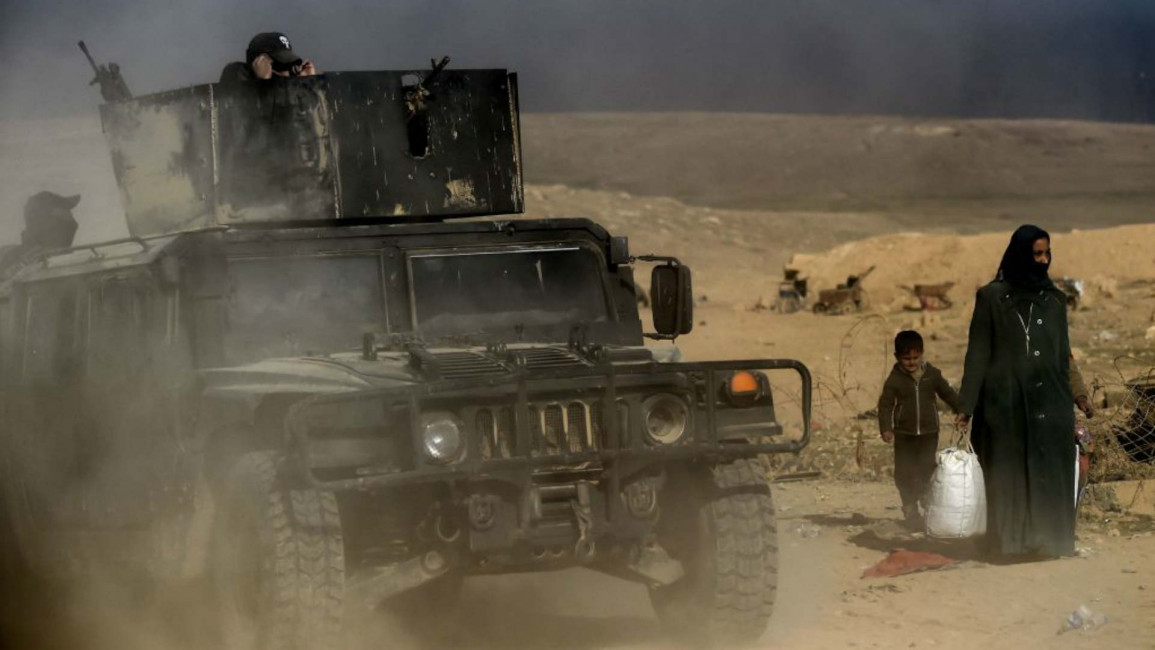
Islamic State have left Mosul, but the battle will relocate to the desert
Iraqi Prime Minister Haidar Abadi announced on Monday Iraqi Forces' victory over Islamic State (IS) in Mosul. All eyes now turn to the city of Raqqa, where a month-long battle has already killed over 650 people.
But the real fight against the terrorist organisation may lie hundreds of kilometres away, in the steppe area connecting the Syrian province of Deir az-Zour to the Iraqi province of Anbar.
This week, IS preachers in the Deir az-Zour governorate called on fighters to join the Raqqa front; the last main bastion of the so-called Islamic caliphate. With IS losing ground, various forces have been making territorial gains over the terrorist organisation in east Syria.
From the north, the Syrian Democratic Forces backed by the US-led coalition have retaken several areas within central Raqqa. To the west, forces loyal to the Assad regime backed by Iranian militias such as Hizballah are slowly gaining ground.
This progress triggered a severe backlash from the US-led coalition last month, which targeted pro-Syrian and Iranian militias along the Baghdad-Damascus highway near the US base al-Tanf. Iran's main goal in eastern Syria appears to be to establish a land corridor linking Tehran with its proxies in Baghdad, Damascus and Beirut.
Eastern Syria is viewed as equally important by IS, it is after all, there that the organisation's future may be re-defined.
 |
Islamic State's retreat from Mosul and Raqqa to the Badia will allow the movement to regroup its forces in the border region |  |
"The Mosul war triggered a wave of immigration of IS fighters and their families in the Deir az-Zour area, specifically in Mayadeen and Bu Kamal," says a resident of Bu Kamal, speaking on condition of anonymity.
Islamic State's retreat from Mosul and Raqqa to the Badia will allow the movement to regroup its forces in the border region stretching from Deir az-Zour to the Anbar governorate where IS power centres are still inter-connected.
| Read more: Iraqi leader Abadi vows 'no amnesty for terrorists' as troops 'mop up' Mosul | |
In addition, from a military standpoint the Badia is more difficult to control, due to the vast territorial expanse and the numerous smuggling routes and weapon caches IS has built. Fighting IS in the steppe region would require massive air coverage and a substantial deployment of troops that would leave urban centres vulnerable, specifically on the Iraqi side.
On July 11, the president of the council of Hit in Anbar, Mohammed al-Mohammadi warned that Islamic State militants could slip easily into the city of Hit, noting that the number of police troops was insufficient for its protection.
 |
Fighting IS in the steppe region would require massive air coverage |  |
Eastern Syria residents speak of IS attempts to reshuffle its fighting force into a more horizontal structure, trying to improve lines of communication and appointing new mid-level members to commanding positions, depleted by coalition strikes and defections.
In recent months, IS responded to members who refused to abide by instructions with mass executions. Rumours of the death of IS leader Abu Bakr al-Baghdadi may have only aggravated the situation. Iraqi News reported infighting in the Iraqi city of Tell Afar between Baghdadi's loyalists and opponents, prompting the group to carry out widespread arrests and to impose a curfew on the town.
Islamic State is an organisation coming under increasing pressure on all fronts, and more frequent insurrections and military calculations will accelerate the process of its decentralisation.
 |
Islamic State militants could slip easily into the city of Hit |  |
By decentralising, the organisation may have a better chance of survival in the Iraqi and Syrian Badia. In addition, as the organisation unravels, unruly IS leaders may now compete to take power.
This week, an IS leader in the Iraqi city of Hawija was quick to proclaim himself the organisation's emir, as rumours of Baghdadi's death spread.
A final by-product of these new dynamics may be, ultimately, a return to a more Iraqi-centric IS command structure.
The widespread killings and defections of foreign jihadists in the last few months also mean that it is an Iraqi hard core and more invested nucleus that may be more willing, and capable of entrenching itself for a longer insurgency.
Mona Alami a non-resident fellow with the Atlantic council covering Middle East politics with a special interest in radical organizations. Follow her on Twitter: @monaalami
Opinions expressed in this article remain those of the author and do not necessarily represent those of The New Arab, its editorial board or staff.




